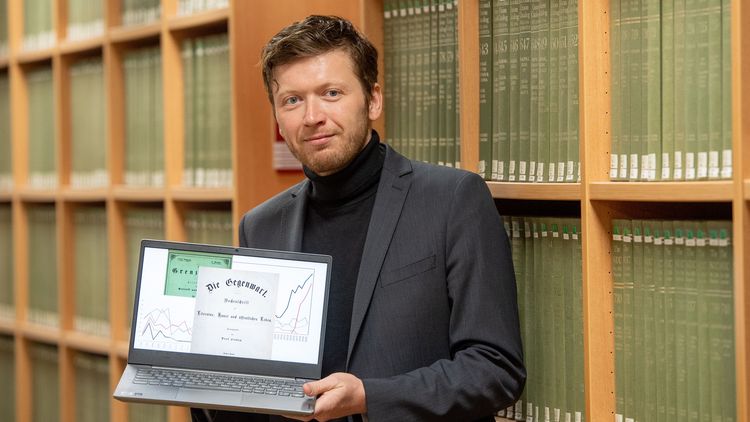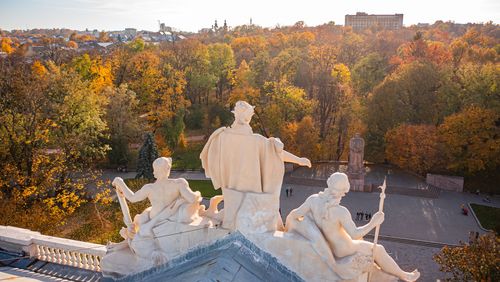How does one go about studying three centuries' worth of literary journals? Haimo Stiemer is banking on digital analysis methods – and has secured a "Carl von Ossietzky Young Researcher's Fellowship" with this approach.
Reading literary journals from the past and present provides a glimpse behind the scenes of the literary world: writers testing their skills, critics blasting new publications or singing their praise, and authors from Goethe to Brecht creating powerful literary concepts. For writers, journals thus serve as both a literary mouthpiece and an experimental laboratory.
They are also of great interest for literary scholars, as a source of valuable information on such matters as the relationship between authors and journalists, for example. It is therefore all the more surprising that, with the exception of a few particularly well-known titles, literary journals have not been subject to systematic research so far. Dr. Haimo Stiemer now aims to close this gap: endowed with a "Carl von Ossietzky Young Researcher's Fellowship", he plans to write a comprehensive history of German-language literary journals spanning the entire period from the launch of the first titles at the end of the seventeenth century to the late twentieth century. His research will also investigate the extent to which economic factors shaped the literary scene and literary production.
"The fact that there is still no comprehensive research on this topic is mainly due to the vast amount of material," explains Stiemer. Although literary scholars have already digitised journals and systematically recorded many titles in bibliographies, until recently the resources for evaluating source material from several centuries in greater detail were lacking. The "digital humanities" approach, which brings digital tools and methods to the study of the humanities, has now made this possible and is particularly useful for projects involving the analysis of extremely large amounts of text – which is exactly what Stiemer plans to do in his project. He uses digital methods not only for research purposes, but also for analysing the content of texts.
When computers analyse texts
Stiemer uses software programmes such as Catma, Gephi or NetworkX with which he can search an almost unlimited amount of texts using search terms such as the names of authors, publishers or journalists. The software can also analyse how frequently and in which publications these persons were linked to each other and create diagrams representing these connections. By defining semantic fields which indicate positive or negative attitudes and emotions, and searching the texts for such words, Stiemer can also use the software to determine whether the authors, journalists or publishers tended to be friendly or critical towards each other. "The combination of these two methods could put many statements in the journals in a new light," Stiemer explains. Publishers writing enthusiastic reviews of their own authors' works, for example.
With his research, Stiemer aims to challenge established forms of literary historiography which attribute the success or failure of an author mainly to the literary qualities of their texts, without taking other factors into account. "When authors become successful, it is never because of their literary talent alone," he explains. In many such cases gifted authors and skilled publishers come together, combining literary talent with targeted advertising strategies. Stiemer analysed these connections in his dissertation on the German-language "Feuilleton" (the literary and arts section in newspapers) in Prague at the end of the nineteenth and early twentieth centuries. His objective was the same as in his current project: to rewrite literary history with the focus on the extensive networks that connected authors, publishers and journalists, rather than just a few "geniuses".
The mechanisms of the literary market
With this approach, Stiemer, who studied social sciences as well as German literature, references French social scientist Pierre Bourdieu (1930-2002) and his "field theory". Bourdieu studied the societal rules and mechanisms that prevail in the literary market and observed that economic interests played an important, but not dominant role. According to him, from a historical perspective the economic influences were diminishing and authors were writing more and more for art's sake, rather than in the pursuit of financial success.
In the future, Stiemer plans to investigate to what extent this applies not only for the German-language literary scene, but others too. The "Carl von Ossietzky Young Researcher's Fellowship" will enable him to apply for funding from the German Research Foundation (DFG) and recruit his own junior research group, including scholars from English, Dutch or Slavic studies. Stiemer then plans to apply his research methods to the literary journals of other countries, too. One question he would like to investigate in this context is the extent to which literary developments in different countries influence each other. Because there are two things Stiemer can already say with certainty: literature and business cannot be kept strictly separate from one another, and the literary trends of individual countries do not develop independently of each other.





